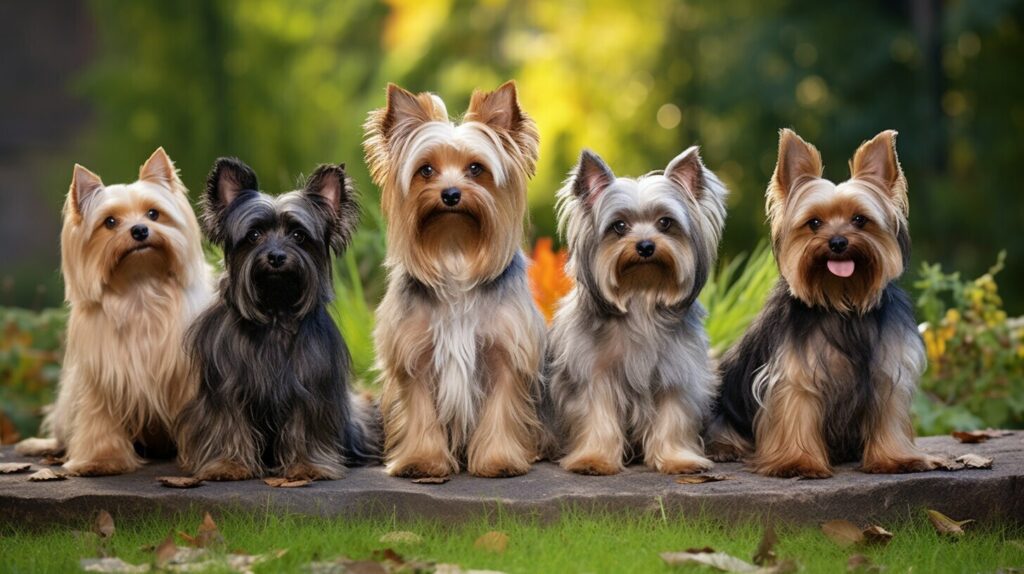Are you considering adding a furry friend to your household? If so, small breed dogs may be the perfect choice for you. Small breed dogs are defined by their size, typically weighing between 5 and 22 pounds and standing less than 16 inches tall. They are often referred to as toy dogs, miniature dogs, or even teacup dogs due to their adorable size.
But owning a small breed dog is more than just having a cute companion. These dogs offer a plethora of benefits, including their ability to adapt to different living situations, their affectionate personalities, and their low-maintenance requirements.
In this comprehensive guide, we will explore the different types of small breed dogs, their unique characteristics, and the joys and benefits of owning them. We will also provide tips on caring for and training your new furry friend to ensure a happy and healthy life for both of you.
Key Takeaways:
- Small breed dogs are defined by their size and often weigh between 5 and 22 pounds.
- Small breed dogs are affectionate, adaptable, and low maintenance.
- This comprehensive guide will cover the different types of small breed dogs, their characteristics, and tips for care and training.
What Defines Small Breed Dogs?
If you’re considering adding a furry companion to your life, small breed dogs can be a great option for many reasons. But first, let’s define what makes a dog a small breed! Generally, small breed dogs are defined as those that weigh under 22 pounds and stand less than 16 inches tall at the shoulder. However, there are a few exceptions to this rule, such as the miniature poodle, which can weigh up to 15 pounds but is still considered a small breed.
Some of the most popular small dog breeds include the Chihuahua, Yorkshire terrier, Shih Tzu, Pomeranian, and dachshund. These breeds are known for their small size and unique personalities.
Small breed dogs come in a variety of types, such as toy dogs, miniature dogs, and even teacup dogs. Toy dogs are the smallest type, weighing under 6 pounds, while miniature dogs can weigh up to 15 pounds. Teacup dogs are a recent trend, and they are even smaller than toy dogs, typically weighing under 4 pounds.
The Charm of Small Breed Dogs
There’s something undeniably adorable about small breed dogs. From the tiny teacup Chihuahua to the miniature Dachshund, these pups pack a lot of personality into their petite frames. Small breed dogs, also known as toy dogs or miniature dogs, make wonderful companions for their cute features, playful energy, and suitability for a range of lifestyles and living situations.
If you live in a small apartment or have limited outdoor space, a small breed dog can be a perfect fit. They don’t require as much exercise as larger breeds and can expend their energy through indoor play. Their small size also means they’re easier to handle and transport, making them ideal for families with young children.
Not only are small breed dogs cute and convenient, but they also come in a variety of breeds, each with their own unique characteristics. Some breeds, like the Pomeranian and Shih Tzu, have thick, fluffy coats that require regular grooming, while others, like the Italian Greyhound and Whippet, have short, sleek coats that shed minimally. Whatever your preference, there’s a small breed dog out there that will steal your heart.
When it comes to personality, small breed dogs are known for their spunky and affectionate natures. They often have big personalities and love to be the center of attention. Despite their small size, they are still dogs and require proper training and socialization to thrive. With the right care and attention, small breed dogs can make wonderful companions, bringing joy and love to your life for years to come.
Small Dog Breeds for Apartments
If you’re looking for a furry companion to keep you company in your apartment, a small breed dog can be a great choice. These dogs are compact, portable, and can make the most of a small space. However, not all small dog breeds are equally suited for apartment living. Here are some small dog breeds that are well-adapted to life in an apartment:
| Breed | Temperament | Exercise Needs |
|---|---|---|
| Chihuahua | Feisty, loyal, affectionate | 15-30 min/day |
| Boston Terrier | Friendly, playful, adaptable | 30-45 min/day |
| Pomeranian | Bold, inquisitive, loyal | 30-45 min/day |
| Shih Tzu | Outgoing, affectionate, adaptable | 30-45 min/day |
When choosing a small dog breed for your apartment, consider their energy levels, exercise needs, and adaptability to smaller spaces. You’ll also want to make sure they have toys and activities to keep them mentally stimulated and prevent boredom.
Remember, just because a dog is small, doesn’t mean they can’t be a handful. Proper training and exercise are important for all dogs, regardless of size. And always make sure to check with your apartment complex to ensure they allow pets and have any necessary restrictions or fees.
Small Dog Breeds for Families
Small breed dogs can make wonderful family pets. They are typically friendly, affectionate, and adaptable to different living situations, making them a great choice for households with children.
When it comes to choosing a small dog breed for your family, there are several factors to consider. You want to choose a breed that is gentle, patient, and tolerant with children, as well as one that is easy to train and has low exercise requirements.
Here are some of the best small dog breeds for families:
| Breed | Size | Temperament | Trainability |
|---|---|---|---|
| Beagle | Small to Medium | Friendly, Curious, Energetic | Moderate |
| Cavalier King Charles Spaniel | Small | Affectionate, Gentle, Loyal | Easy |
| French Bulldog | Small | Playful, Sociable, Affectionate | Moderate |
| Miniature Schnauzer | Small | Energetic, Alert, Obedient | Easy |
| Pug | Small | Charming, Docile, Loyal | Easy |
Remember, it is best to research each breed carefully and consider their specific needs and personality traits before making a decision.
When introducing a small dog breed to your family, it is important to teach children how to handle and interact with the dog appropriately. This includes not pulling on their ears or tail, and not disturbing them while they are eating or sleeping.
With proper care, training, and socialization, a small dog breed can make a wonderful addition to any family.
Hypoallergenic Small Dogs
For those with allergies, owning a dog may seem impossible. However, with hypoallergenic small dog breeds, you can still experience the joy of owning a furry companion without the discomfort of allergies. These breeds have coats that produce fewer allergens, making them suitable for individuals with allergies.
When considering hypoallergenic small dogs, it’s important to note that no dog breed is completely hypoallergenic. However, these breeds are known to produce fewer allergens:
| Breed | Coat Type |
|---|---|
| Bichon Frise | Curly, dense coat |
| Poodle | Curly, dense coat |
| Shih Tzu | Long, silky coat |
| Maltese | Long, silky coat |
Regular grooming is necessary for hypoallergenic small dogs to maintain their coats and reduce allergens. It’s important to brush their coats regularly and schedule professional grooming appointments to keep their coats free of mats and tangles. Additionally, bathing them once a month can help to remove any potential allergens on their coat.
Overall, hypoallergenic small dogs are a great option for individuals with allergies who still want the companionship of a furry friend. Just be sure to properly maintain their coats and regularly groom them to minimize allergens.
Low-Shedding Small Dogs
If shedding is a concern for you, there are several small dog breeds to consider that have minimal shedding. These breeds have coats that grow continuously rather than shedding, which requires regular grooming to maintain their appearance and reduce matting.
Low-shedding small dog breeds include:
| Breed | Coat Type |
|---|---|
| Bichon Frise | Curly and dense |
| Chinese Crested | Bald with hair on certain parts of the body, or a powderpuff variety with long hair |
| Havanese | Silky and wavy |
| Maltipoo | Soft and fluffy |
| Poodle (Toy and Miniature) | Curly and dense |
| Shih Tzu | Long and flowing |
| Yorkshire Terrier | Silky and straight |
If you own a low-shedding small dog, it is important to maintain their coat with regular brushing and grooming. This not only helps to reduce matting and keep their coat looking healthy and shiny, but it also minimizes the amount of hair that they may shed around your home.
If you or someone in your household has allergies, it is important to note that no dog breed is completely hypoallergenic. However, low-shedding dogs are less likely to produce as much dander, which is the main allergen that causes reactions in people with allergies.
Caring for Small Breed Dogs
Small breed dogs require specific care and attention to help them thrive. From grooming to exercise and nutrition, here are some essential tips to keep in mind when caring for your furry friend:
Grooming
Grooming is an important part of caring for small breed dogs. Regular brushing helps to remove loose fur and prevent matting. It also promotes healthy skin and coat. Depending on the breed, your dog may require professional grooming every few months to trim their coat and nails.
Exercise
While small breed dogs may be tiny, they still need regular exercise to stay healthy and prevent obesity. Aim for at least 20 to 30 minutes of exercise each day, such as a brisk walk or playtime in the backyard. Be mindful of your dog’s limitations and adjust their activity level accordingly.
Nutrition
Small breed dogs have unique nutritional needs that require a high-quality diet. Opt for a dog food that is specially formulated for small breeds, providing the right balance of protein, carbohydrates, and fat. Consult with your veterinarian to determine the appropriate feeding schedule and portion sizes for your dog.
Veterinary Care
Regular visits to the veterinarian are crucial for maintaining your small breed dog’s health. Schedule annual check-ups to monitor their overall health and address any concerns. It’s also important to keep up with vaccinations and preventative care, such as heartworm and flea and tick prevention.
By following these tips, you can help ensure that your small breed dog stays healthy, happy, and thriving for years to come.
Training and Socializing Small Breed Dogs
Small breed dogs are intelligent and eager to please, making them highly trainable. However, they can also be stubborn and territorial, so it’s important to start training early and consistently. Socialization is also crucial, as small dogs can be prone to fear and aggression if not exposed to a variety of people and other dogs.
Here are some tips for training and socializing your small breed dog:
Start with Basic Commands
Begin training your small breed dog with basic commands such as sit, stay, come, and down. Use positive reinforcement techniques such as treats, praise, and playtime to encourage good behavior. Consistency is key, so make sure everyone in the family is using the same commands and reward system.
Socialize Early and Often
Expose your small breed dog to a variety of people and other dogs from a young age. Take them to dog parks, puppy classes, and socialization events. This will help them learn appropriate behavior and reduce the likelihood of fear and aggression towards strangers and other dogs.
Address Behavioral Issues Promptly
If your small breed dog exhibits problematic behavior such as excessive barking, digging, or aggression towards people or other dogs, it’s important to address it promptly. Consult with a professional dog trainer or behaviorist for guidance on how to correct the behavior.
Remember, small breed dogs thrive on positive reinforcement and consistent training. With patience and dedication, you can have a well-behaved and socialized small breed dog that brings joy to your family and community.
Conclusion
Congratulations! You have now explored the joys and benefits of owning a small breed dog. From their cute and charming personalities to their suitability for various living situations, small breed dogs can make wonderful companions.
We have covered the defining characteristics of small breed dogs and highlighted some popular breeds, including those that are great for apartment living, families, and those with allergies or minimal shedding.
To ensure your small breed dog stays happy and healthy, it is essential to provide regular care, including grooming, exercise, proper nutrition, and regular check-ups with your veterinarian. Training and socialization are also key to ensuring they become well-behaved and happy members of your family.
Thank you for reading our comprehensive guide to small breed dogs. We hope you have found it useful in choosing the perfect furry friend for you. Remember – a small dog can bring big joy to your life!
FAQ
Q: What defines a small breed dog?
A: Small breed dogs are typically characterized by their smaller size, weight, and height. They are known for their compact physique and are often referred to as toy dogs, miniature dogs, or teacup dogs.
Q: What are some popular small dog breeds?
A: Some popular small dog breeds include Chihuahuas, Pomeranians, Yorkshire Terriers, Shih Tzus, and French Bulldogs, among others.
Q: Why are small breed dogs charming?
A: Small breed dogs have an undeniable charm due to their adorable size and cute features. They are often considered affectionate, loyal, and easy to handle, making them appealing to many owners.
Q: What small dog breeds are suitable for apartment living?
A: Small dog breeds that are well-suited for apartment living are those with lower energy levels and exercise needs. Some examples include Cavalier King Charles Spaniels, Bichon Frises, and Pugs.
Q: Which small dog breeds are great for families?
A: Small dog breeds that are great for families are those that are compatible with children, have a friendly temperament, and are easily trainable. Breeds such as Beagles, Boston Terriers, and Cavalier King Charles Spaniels are often recommended.
Q: Are there hypoallergenic small dog breeds?
A: Yes, there are hypoallergenic small dog breeds. These breeds have coat types that produce fewer allergens, making them suitable for individuals with allergies. Some examples include the Bichon Frise, Maltese, and Shih Tzu.
Q: Which small dog breeds are low-shedding?
A: Some small dog breeds are known for their low-shedding coats. Breeds such as the Yorkshire Terrier, Havanese, and Miniature Schnauzer are considered to be low-shedding.
Q: How do I care for a small breed dog?
A: Caring for a small breed dog involves regular grooming, providing appropriate exercise, feeding a balanced diet, and ensuring regular veterinary check-ups for vaccinations and overall health maintenance.
Q: How do I train and socialize a small breed dog?
A: Training and socializing a small breed dog involves early training and socialization, exposing them to different environments, other dogs, and people. Consistency, positive reinforcement, and addressing common behavioral issues are key in their development.
Q: What are the main points to take away about small breed dogs?
A: Small breed dogs offer a unique charm and appeal due to their adorable size and characteristics. They can be great companions for various lifestyles, whether in apartments or families, and there are hypoallergenic and low-shedding options available. It is important to provide proper care, grooming, training, and socialization to ensure their well-being and happiness.



